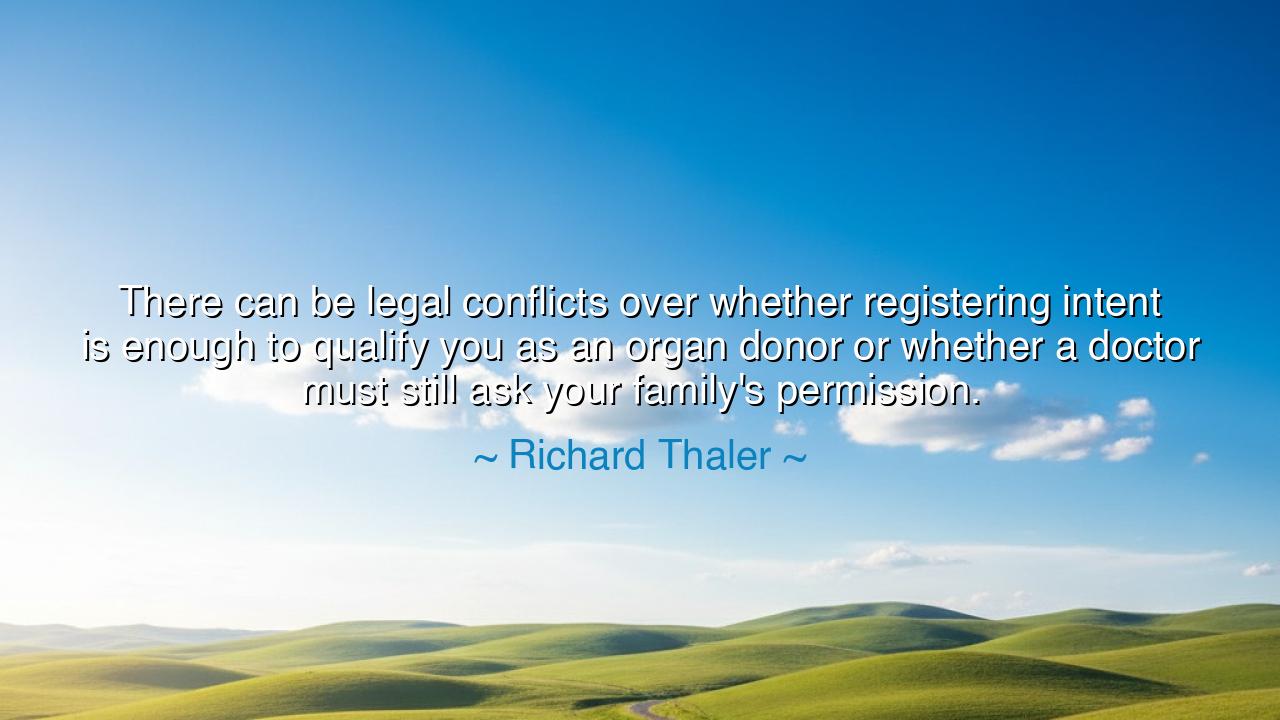
There can be legal conflicts over whether registering intent is
There can be legal conflicts over whether registering intent is enough to qualify you as an organ donor or whether a doctor must still ask your family's permission.






The words of Richard Thaler, “There can be legal conflicts over whether registering intent is enough to qualify you as an organ donor or whether a doctor must still ask your family’s permission,” shine a light on one of the most delicate crossroads of human existence — where law, ethics, and love intertwine. His words remind us that even in the face of death, when the heart falls silent and the body fades, the spirit of giving can still speak through the will of the living. Yet, as Thaler warns, the voice of the individual — their declared intent — can sometimes be muffled by the grief and hesitation of those left behind. The struggle between personal choice and familial sorrow becomes not only an ethical debate, but a legal conflict that echoes with the weight of human emotion.
Since the earliest days of civilization, societies have grappled with the question of ownership over the body — whether in life or in death. In ancient times, the body was considered sacred, a vessel belonging not merely to the person but to their ancestors, their gods, or their community. To disturb it was seen as sacrilege. Yet, as humanity’s understanding deepened, we came to recognize another sacred truth: that one person’s passing could give another the gift of life. Thus arose the modern concept of organ donation, a practice both noble and profound — the final act of generosity from one mortal to another. But with it came new dilemmas: Who holds authority over that decision — the individual who lived, or the family who mourns?
Thaler’s insight captures the essence of this tension. The registration of intent, he notes, is an expression of a person’s will — a promise made in life. But the law, in its cautious wisdom, often requires that the family’s consent still be sought at the hour of death. This is not mere bureaucracy; it is an acknowledgment of human frailty. In that moment of unbearable loss, even the clearest written wish may tremble under the weight of emotion. The law seeks to honor both — the rational clarity of the departed and the sacred grief of the living. Yet, this dual allegiance gives rise to confusion, delay, and sometimes tragedy — for every moment of indecision may cost another life waiting in a hospital bed, breath fading, heart failing.
Consider the story of Nicholas Green, a young boy from California whose life was taken by accident while on a family trip in Italy in 1994. His parents, in their unimaginable sorrow, chose to donate his organs. Their decision saved seven lives, and the act inspired an entire nation to reexamine its approach to organ donation. Italy, moved by their courage, changed its laws to make registered intent sufficient for donation — no longer requiring families to grant permission anew. In that act, grief became grace, and from one family’s tragedy bloomed a forest of hope. Nicholas’s story remains a beacon — a reminder that compassion can triumph over hesitation, and that law must sometimes be shaped by the nobility of the human heart.
Thaler’s words also reflect the deeper moral philosophy he devoted his life to — the understanding that humans are not purely rational beings. Even when we make decisions in clarity, our emotions can lead us astray in moments of pain or fear. That is why systems of law and policy must be designed not for perfect logic, but for the complexity of the human soul. The legal conflict he speaks of is not merely about consent; it is about empathy — how to honor both the will of the giver and the sorrow of the survivors. It is a reminder that wisdom lies not in rigid rules, but in the compassionate balance between principle and mercy.
From this reflection arises a profound lesson for the living: if you wish to give life beyond your own, make your intent unmistakable. Speak it aloud to your loved ones, write it down, and let your actions in life mirror your convictions. Do not leave your family burdened with uncertainty; give them the peace of knowing your heart’s true wish. For in death, as in life, clarity is kindness.
And so, let these words be passed to future generations: life is not ours to hoard, but to share. Whether through teaching, love, or the literal gift of one’s body, our final act can be one of unity and compassion. The law may wrestle with permission, and families may struggle with grief, but the spirit of giving — that timeless flame — must not fade. Live so that when your days are done, your legacy may breathe on in others, and your intent, once declared, becomes a bridge between mortality and immortality — between the sorrow of the moment and the eternal rhythm of life renewed.






AAdministratorAdministrator
Welcome, honored guests. Please leave a comment, we will respond soon